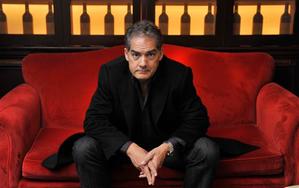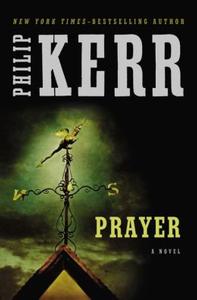
|
|
| photo: Phil Wilkinson/The Scotsman | |
Prayer is the latest stand-alone novel from Philip Kerr, well known for his Bernie Gunther mystery novels. Prayer is the story of skeptical atheist FBI agent Gil Martins and his investigation into the recent deaths of several prominent atheist thinkers. Martins must confront his own beliefs when his first suspect confesses that she killed them with prayer.
As Martins investigates her seemingly preposterous claim, he begins to feel stalked by an ancient evil, forcing him to decide whether God is real and, if so, out to get the unbeliever.
Kerr describes Prayer as a police procedural as William Peter Blatty, author of The Exorcist, might write it.
Why write about religious faith?
Well, the inspiration was my own history, really. I had a religious upbringing as a child; I was born in Edinburgh, we went to church three times on a Sunday. Four, if we were lucky.
My parents had originally been members of the Free Church of Scotland. They decided that was a little bit on the liberal side, so they became Baptists.
I viewed the whole thing initially with the enthusiasm of a child wanting to please his parents. After a while, I began to question it, but learned to question it fairly quietly. I became, at the very least, an agnostic if not a full atheist. But the whole subject continued to be of enormous interest to me.
Salman Rushdie said there's a God-shaped hole inside us all, in the same way that Chomsky argues that there's a sort of language-shaped hole. So I guess I still feel the existence of a God-shaped hole, even if I don't find that God fits neatly into it anymore. So for me, it's a very complicated set of circumstances, how I came to write about this. It seemed a logical thing to do, to deal with the God who really exists in the Bible, not this sort of benign Father Christmas figure that we use.
As He said, "I'm a jealous God." And he's a God of anger, and he's not a very nice God, I don't think.
No, he's terrifying.
The Devil has sort of stopped being frightening. So I think you want to look around for the person who even the Devil is frightened of, and that's God.
So I wrote with the full confidence of someone who had previously been a church-goer. I think that's what you need, really: the full zeal of someone who's an apostate.

I think it's based very much on upbringing. My parents were very religious. Because they were Baptists, [their church] used to have this weird thing every month when they would lift up the floorboards and the carpets and reveal this small swimming pool. People would be baptized in it.
They would stand in front of the congregation wearing curious shifts that looked very like the sort of the thing you'd wear in your coffin, which wasn't a promising start. They would stand in front of a microphone and then tell the whole congregation why they were inviting Jesus into their lives, and then they would be dunked under the water.
For me, you see, I had an early near-drowning experience as a child. I had an abhorrent, very real fear of water until I was about 12. I thought, "Well, you know, that's just never gonna happen to me. I'm never gonna be fully immersed under the water, and therefore my sins will never be washed away. I might as well quit now on the whole idea of being Christian."
So instead of thinking Godly thoughts, I used to sit there and think very un-Godly thoughts. I guess that's where I started writing, actually, in the church. It kept me amused, and my parents, of course, thought I was probably writing texts from the Bible or something like that.
You must have done a lot of research on the FBI and the southern part of the U.S., in which the novel is set. How did you go about that?
I was lucky enough to broker a good contact with the FBI, partly because the guy who's the military head of NATO is a fan of my books. I think that helped swing it, really. They realized I wasn't a security threat, because I'd already spent the weekend at the admiral's house in Belgium.
And actually, that was only half the reason to go. The second reason was that they have the largest church in the world in Houston. It's called the Lakewood Church, and it's 17,500 members strong. They also have the second biggest one, which is I think is called the Second Baptist Church or something like that, which has a mere 12,000 members.
It was the complete opposite of the experience I expected to have, which was to find Texas filled with all kind of rednecks, Republicans and gun-toting nutters. They couldn't have been more friendly, actually. I really liked them; they were terribly hospitable and very courteous. I formed the conclusion that one of the reasons why Texans are so courteous is probably because they're all armed. It does make people polite.
I kept asking myself what would happen if people in Scotland owned guns, and I put that in the book as kind of a joke, that the country would be decimated because they're all so aggressive and foaming at the mouth in how they behave with each other--there would be a shooting every half hour.
The FBI couldn't have been more helpful, too. They were open and friendly, not in the least bit like the sort of Hoover "G-Men" that you imagine from the movies. In fact, most of the people I dealt with were women, actually. And women in the FBI, now, are much more important than they used to be.
How did you write the authentically American characters in Prayer?
I guess you've really got to feel sympathy with the people who are there. You've got to like them. If you're gonna write about them, you've got to get under their skins. I think you've got to feel, in a sense, that you could become one of them.
And that's the great thing about Texas, especially Houston; it's a city where lots and lots of people go to live. It's not a city where people are born. It's an immigrant city; lots of people come from all over the United States. I felt I could easily end up in somewhere like Houston.
It helped I was in a fantastic hotel, the Houstonian, which I think was originally a house owned by George W. Bush. It was a fantastic country club hotel with enormous swimming pools and even more enormous restaurants, which of course my kids adored. So, you know, for a British person going there, what's not to like? There are masses of food and the weather is fantastic. --Rob LeFebvre, freelance writer and editor

